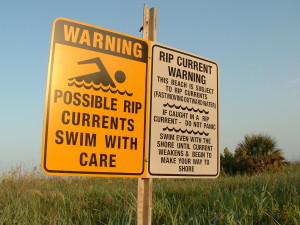My wife and I just went on a trip to the coast with a couple of close friends. The first day after checking into the condo there was a harsh reality check to how dangerous playing in the ocean waves can be.
“GULF SHORES, Alabama — Less than 24 hours after three swimmers drowned off the Fort Morgan peninsula, a fourth person died about noon Monday as he tried to save a relative in the Gulf of Mexico, according to city officials.
Warren H. Moore, 62, of Jonesboro, Ark., was pulled under by the strong currents after he tried to save a woman in distress just west of the Gulf State Pier near the Royal Palms condo, said Baldwin County Coroner Stan Vinson.”
http://blog.al.com/live/2013/06/fourth_vacationer_drowns_on_ba.html
We arrived the day after the reported three swimmers drowned, but we had a clear view of the events of the next day from the balcony. The scene at the beach and in the ocean was very disturbing and was a stern reminder of how fast the ocean can claim lives.
Most of us on the trip were aware of what to do if we got caught in a rip current, and the news on TV re-educated us on how to survive a rip current. This survival skill needs to be second nature for anyone enjoying the ocean and even lakes! Yes dangerous rip currents occur in any large body of water.
How to survive a rip current.
- Keep your feet on the bottom as much as possible. A firm footing can help you not get caught up in a rip current.
- Remaining calm is the most important aspect to making it through any survival situation. If you get pulled away from shore by a rip current do not panic. It will most likely only pull you from shore and they seldom pull you under.
- Regain your footing if you can. If you can reach the bottom you may be able to dig in and not get pulled out. Don’t struggle to hard because you may get worn out while not making any progress.
- Call for help if a lifeguard is nearby. A bystander or friend may be helpful if you’re a weak swimmer, but it may make the situation more dangerous. A helper can quickly become a victim as well or they could panic and drag you under. The man that drowned outside our rented condo was trying to help…
- Swim to the side, not directly towards the beach. It’s natural to want to go directly to safety. But all you’ll do is tire yourself out until you can’t swim. The ocean is much more powerful than you are! Since rip currents are narrow- rarely over 100-150 feet wide, you can easily swim out of one by swimming parallel to the beach.
- If you can’t swim out for any reason float on your back or gently tread water until you’re out of the current. The currents are usually short, and will likely only pull you 50 to 100 feet from shore. Then signal for help or swim to the side- or parallel to the coast.
- Swim towards shore once you’ve escaped the rip tide. If you need to rest float for a minute and then continue your swim to shore. By this point you have escaped the biggest danger and you don’t need to wear yourself out to quick. Pacing yourself is crucial when swimming any distance from shore.
Hopefully these steps for surviving a rip current can help someone this summer during the busy beach vacation months.
A practice that we observe when at the beach is to keep a flotation device handy. This can be as simple as a boogie board or a foam noodle. Anything that will keep you afloat if you’re pulled out by a rip current.
Rip currents are very survivable if you can keep calm and remember what to do. In fact lifeguards often use rip currents to get past the waves quickly to reach someone farther out. And Surfers intentionally use them to get out to the big waves quickly.
Don’t be afraid to signal a lifeguard if you start getting pulled out. They are well trained, just remember to stay calm. Waving with both arms above your head is the universal signal for a swimmer in distress.
Be careful at the beach this summer and make sure everyone in your group is educated on rip currents.
If you have any tips for the community jump down to the comments and let your voice be heard. Also don’t forget to like PrepCabin.com on Facebook!
on Facebook!
